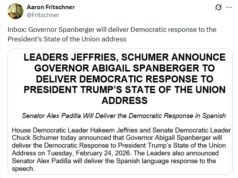From Rep. Abigail Spanberger (D-VA07)’s office:
Spanberger Helps Lead Introduction of Bipartisan Bill to Prevent Future Baby Formula Shortages
The “Formula Shortage Reporting Act” Would Require Formula Manufacturers to Notify the FDA about Looming Potential Disruptions to the Formula Market
Congresswoman: “The American People, Particularly Parents, Deserve this Information”
WASHINGTON, D.C. — U.S. Representative Abigail Spanberger yesterday co-led the introduction of bipartisan legislation to prevent future baby formula shortages and increase transparency within the formula industry.
There is currently no requirement that manufacturers of formula must notify the U.S. Food and Drug Administration (FDA) of manufacturing facility issues or production disruptions that could impact the market. This lack of transparency leaves the market for baby formula — which relies on only a few manufacturers — highly vulnerable to a disruption at a single factory, as well as unprepared for shortages after a disruption occurs. The Formula Shortage Reporting Act would make sure the FDA receives timely information from manufacturers about anticipated disruptions of infant formula supply.
“With proper warnings and oversight, this formula shortage could have been prevented. The FDA needs accurate and timely information about potential shortages of ingredients or supply chain disruptions — and the American people, particularly parents, deserve this information,” said Spanberger. “This bipartisan bill would require American formula manufacturers to notify the FDA Commissioner about looming interruptions that could be coming down the road. In this way, we can make sure baby formula stays on the shelves, contingency plans are made, and families have renewed peace of mind. I want to thank my colleague and friend Congressman Johnson for his partnership on this commonsense measure.”
Spanberger introduced the bipartisan bill alongside U.S. Representatives Dusty Johnson (R-SD-AL), Kim Schrier, M.D. (D-WA-08), and Stephanie Bice (R-OK-05).
“Infant formula is medically necessary. The FDA should be informed of any future delays – but currently, that’s not the law of the land,” said Johnson. “South Dakota was hit hard during this formula shortage – my bill allows us to be better prepared should an issue at a formula plant ever happen again.”
“It seems inconceivable that we could have a baby formula shortage in 2022. This is preventable. Most babies, even those who are primarily breastfed, rely on formula. Baby formula is a little bit different from food in that babies under six months are nearly entirely dependent on it. In some ways, it makes it more like medicine than food. We need an early warning system for when formula supplies may be getting low so we can take the necessary action to prevent such a shortage from happening again,” said Schrier.
“American families should never have to stare at empty shelves of formula and worry about how they will feed their baby ever again,” said Bice. “I’m proud to support this critical legislation that would require full transparency and accountability from infant formula manufacturers and the FDA. It is imperative that the FDA effectively monitor potential supply chain disruptions and take steps to avoid shortages from happening in the future.”
The Formula Shortage Reporting Act outlines a reporting requirement under the Federal Food, Drug, and Cosmetic Act and would specifically require:
- Formula manufactures to provide notice to the FDA at least 72 hours prior to an interruption.
- Notice of the reasons for the interruption or discontinuance of a product that could lead to a disruption, whether an ingredient or equipment is the reason for the delay, and how long the interruption is expected to disrupt production.
- A 30-day compliance period to provide all necessary information should a manufacturer not comply with the mandatory reporting requirement.
- Manufacturers will be found in violation of Section 301 of the Federal Food, Drug, and Cosmetic Act, which is punishable by fine and/or jail time should they not comply.
Last month, Spanberger cosponsored and voted to pass the bipartisan Access to Baby Formula Act, which provides flexibilities to the Special Supplemental Nutrition Program for Women, Infants, and Children (WIC). These changes would give the U.S. Department of Agriculture the authority to grant state-level WIC programs the flexibilities they need to mitigate the challenges of this crisis faced by families with the highest financial need.
BACKGROUND
Spanberger has been focused on responding to the concerns of Virginia parents and families during this formula shortage — and she has called for immediate action to combat the crisis from both the administration and private companies.
After being pressed by Spanberger to invoke the Defense Production Act (DPA) in response to the shortage, the White House announced that it would invoke the DPA to ensure baby formula ingredients can be expeditiously sent to U.S. manufacturers. Last month, Spanberger directly pressed White House Chief of Staff Ron Klain to strongly consider implementing the DPA in response to the ongoing formula shortage.
Spanberger also urged the White House to consider a range of additional steps to address the shortage — including cutting red tape and increasing imports of safe baby formula from abroad. Soon after, the FDA announced that it would reduce restrictions on formula imports.
Additionally, Spanberger pressed baby formula manufacturer Abbott Laboratories last month to provide answers about the company’s efforts to increase production of formula. Abbott is the leading supplier of baby formula in the United States.












